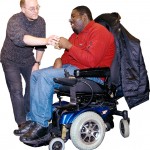
Self-injurious behaviour (SIB) usually directly results in physical harm to an individual. Examples include hand biting, head slapping, picking at skin, gouging or striking the body or eating inedible material. Some researchers have begun to include stereotypy or repetitive movements in a definition of self-injurious behaviour, even if they do not result on tissue damage.. [read the full story…]

